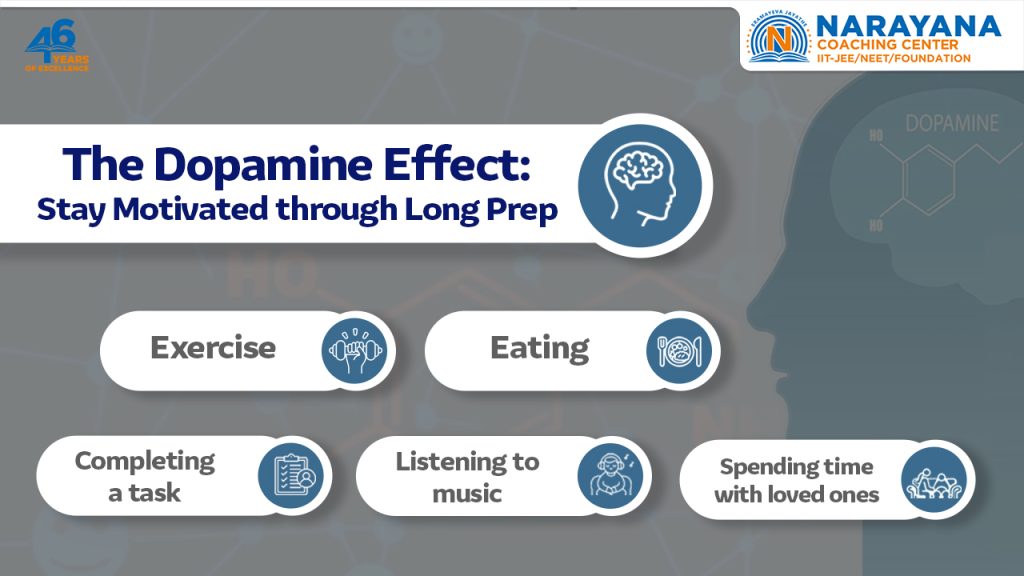
Staying motivated during long-term preparations for exams or other goals often feels like running a marathon. At first, the energy is high, but as days turn into weeks and weeks into months, the excitement tends to fade. That’s where the dopamine effect comes in. Dopamine, often called the “feel-good” chemical, is your brain’s reward messenger. By understanding how it works, you can use it to stay motivated even when the journey feels endless.
In this article, we’ll break down what dopamine is, why it matters for students, and how you can use it to stay motivated in long preparations for exams, competitions, or personal goals.
What Is Dopamine and Why Should Students Care?
Dopamine is a neurotransmitter—a chemical messenger in the brain linked to pleasure, reward, and motivation. Imagine the excitement you feel when:
- You score well on a test
- You finally solve a tough maths problem
- You hear the “ding” of a notification on your phone
That’s dopamine at work. It gives you a little spark of satisfaction and makes you want to repeat that action. For students, this is key because long preparations—such as for board exams, SATs, or entrance tests—can feel boring. By triggering dopamine correctly, you can trick your brain to stay focused.
The Dopamine Effect in Long Preparations
When studying for long-term goals, dopamine helps you:
- Set small rewards that keep you moving forward
- Stay focused instead of getting distracted
- Maintain consistency even when motivation dips
The trick is learning how to release dopamine through healthy, study-friendly ways instead of wasting it on distractions like endless scrolling or gaming.
7 Powerful Dopamine Hacks to Stay Motivated
1. Break Big Goals into Smaller Wins
Instead of saying, “I’ll finish the whole textbook this week,” try:
- Finish one chapter today
- Reward yourself with 10 minutes of music
Every small success gives your brain a dopamine boost, making studying feel less overwhelming.
2. Use the “Gamification” Trick
Think of studying as a game.
- Create a point system
- Give yourself a star for every task completed
- After collecting 10 stars, reward yourself with something fun
Turning boring study sessions into challenges helps your brain release dopamine, much like when playing a video game.
3. The Power of Visualisation
Athletes use this technique all the time. Close your eyes and imagine yourself succeeding—walking into the exam hall with confidence, writing answers smoothly, and earning your dream score. Visualisation creates a dopamine release because your brain treats imagination almost like reality.
4. Dopamine-Friendly Routines
Certain habits naturally increase dopamine, such as:
- Exercise – Even a 20-minute walk helps
- Sleep – A well-rested brain produces more dopamine
- Healthy food – Nuts, bananas, and dark chocolate are natural dopamine boosters
When you care for your body, your brain rewards you with better focus and greater motivation.
5. Use “Temptation Bundling”
Pair something you enjoy with studying. For example:
- Listen to your favourite podcast only while revising notes
- Drink your favourite smoothie while solving practice papers
This connects studying with pleasure, boosting dopamine naturally.
6. Track Progress Visually
Our brains love to see progress. Use:
- A wall calendar and mark each study day with a big ✅
- A progress bar or app that tracks completed chapters
Watching your progress grow gives continuous dopamine hits, motivating you to keep going.
7. Reward the Process, Not Just the Results
Don’t wait until the final exam to celebrate. Reward consistency:
- One week of focused study = a movie night
- Finishing a revision cycle = a fun outing with friends
This ensures dopamine stays steady throughout your preparation and helps maintain long-term motivation.
Common Mistakes That Kill Dopamine
While dopamine can be your best friend, certain habits drain it:
- Too much social media – Quick dopamine hits make studying feel dull
- Cramming without breaks – Your brain stops releasing dopamine when it’s exhausted
- Chasing only results – Waiting months for one big reward lowers motivation
Instead, focus on steady, healthy dopamine boosts through small wins and balanced habits.
Why This Matters for 8th to 12th Graders
Students in grades 8–12 face some of the toughest academic challenges—board exams, competitive tests, and growing expectations. The dopamine effect isn’t just about studying harder; it’s about studying smarter. By applying these strategies, you’ll not only boost academic performance but also build resilience, confidence, and a positive mindset.
Conclusion
The dopamine effect is more than just a brain chemical—it’s your secret weapon for staying motivated during long preparations. By breaking big goals into smaller wins, using gamification, rewarding progress, and building healthy routines, you can make studying not just bearable but enjoyable.
So, the next time your motivation fades, remember: dopamine is on your side. All you need to do is trigger it smartly.
Frequently Asked Questions (FAQs)
Q1. How does dopamine help in studying?
Dopamine acts as a motivation chemical, making tasks feel rewarding and encouraging you to continue.
Q2. Can I boost dopamine naturally without medicine?
Yes! Exercise, sleep, music, healthy food, and small rewards are natural dopamine boosters.
Q3. Why do I feel unmotivated after a few days of studying?
Because your brain gets tired of delayed rewards. You need smaller, more frequent dopamine boosts to stay consistent.
Q4. Is listening to music while studying good for dopamine?
Yes, as long as it doesn’t distract you. Pairing music with studying can boost motivation.
Q5. How long does the dopamine effect last?
It varies, but small rewards and consistent habits keep dopamine flowing throughout long preparations.
Q6. Can dopamine help with exam stress?
Yes. When you feel motivated and rewarded, stress decreases and confidence increases.
